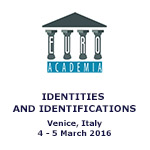Euroacademia Conferences
 Europe Inside-Out: Europe and Europeanness Exposed to Plural Observers (9th Edition) April 24 - 25, 2020
Europe Inside-Out: Europe and Europeanness Exposed to Plural Observers (9th Edition) April 24 - 25, 2020 Identities and Identifications: Politicized Uses of Collective Identities (9th Edition) June 12 - 13, 2020
Identities and Identifications: Politicized Uses of Collective Identities (9th Edition) June 12 - 13, 2020 8th Forum of Critical Studies: Asking Big Questions Again January 24 - 25, 2020
8th Forum of Critical Studies: Asking Big Questions Again January 24 - 25, 2020 Re-Inventing Eastern Europe (7th Edition) December 13 - 14, 2019
Re-Inventing Eastern Europe (7th Edition) December 13 - 14, 2019 The European Union and the Politicization of Europe (8th Edition) October 25 - 26, 2019
The European Union and the Politicization of Europe (8th Edition) October 25 - 26, 2019 Identities and Identifications: Politicized Uses of Collective Identities (8th Edition) June 28 - 29, 2019
Identities and Identifications: Politicized Uses of Collective Identities (8th Edition) June 28 - 29, 2019 The European Union and the Politicization of Europe (7th Edition) January 25 - 26, 2019
The European Union and the Politicization of Europe (7th Edition) January 25 - 26, 2019 7th Forum of Critical Studies: Asking Big Questions Again November 23 - 24, 2018
7th Forum of Critical Studies: Asking Big Questions Again November 23 - 24, 2018 Europe Inside-Out: Europe and Europeanness Exposed to Plural Observers (8th Edition) September 28 - 30, 2018
Europe Inside-Out: Europe and Europeanness Exposed to Plural Observers (8th Edition) September 28 - 30, 2018 Identities and Identifications: Politicized Uses of Collective Identities (7th Edition) June 14 - 15, 2018
Identities and Identifications: Politicized Uses of Collective Identities (7th Edition) June 14 - 15, 2018
Franko B and the Agitation of the Flesh: An Investigation into the Aesthetic, Cultural and Symbolic Significance of Franko B’s Open, Fragmented and Bleeding Body
-
-

-
Presentation speakers
- Alice Hoad, University of Bristol, UK
- Download presentation
Abstract:
Franko B opens up his body. He opens it up again and again. He bleeds. It is unbearable. It is beautiful. We are in awe. Why does he do this? What does it mean to render the body open and vulnerable? What does a transgression of the corporeal boundaries of the human body mean for our social, cultural and political identities? This paper aims to understand the cultural significance of the open, fragmented and bleeding body, drawing in particular on the history of Christian theology, iconography and ritual bloodletting, and examining the work of Italian-born performance artist Franko B (http://www.franko-b.com/home.html). It will explore the transformative and cathartic potential of bloodletting in light of Christian rituals in which blood is considered to have an essentially communicative function, arguing that Franko’s bloodletting performances embody a viscerally-charged form of communication that challenges traditional reception processes and engenders a spectatorship of witnessing. Furthermore, it will attempt to read Franko’s performance-based objects in light of the medieval cult of relics, arguing that they serve an essentially memorial function in recovering some of the ’liveness’ of his performative works. It will also examine the threat of contamination posed to the audience during bloodletting performances, which is particularly pertinent given that Franko B was a gay male artist producing bloodletting works at the height of the AIDS epidemic, in order to investigate contemporary issues surrounding blood, disease, sexuality and gay/lesbian identity. Exploring themes of sacrifice, contamination and redemption, this paper will investigate the cultural and symbolic implications of Franko B’s exploration into the limits and possibilities of his own corporeal boundaries. It will conclude that the ritualised and penetrated male body in both ’primitive culture’ and Christian theology exists in a liminal state of formlessness and ambiguity that challenges the distinct categories of male and female, culture and nature, form and matter, therefore challenging the idea of identity as exclusively heteronormative and heterosexual.
-
Related Presentations

Romanian Dacianism and the Production of a “Vernacular Modernity” in the Context of the Europeanization Process
- Ioana Virginia Brezeanu

Californian Exopolis: Hector Tobar's and Tim Z. Hernandez's Literary Interventions
- Katarzyna Nowak-McNeice













